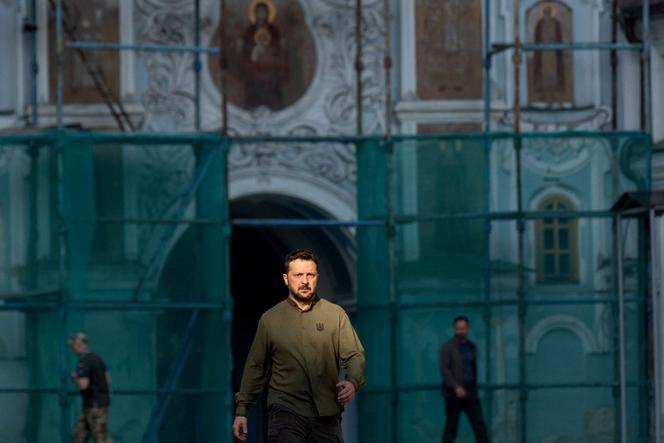


Volodymyr Zelensky is trying to regain the diplomatic initiative after the "peace mission" – considered ill-advised by the West – led at the beginning of July by Hungarian Prime Minister Viktor Orban, who went successively to Kyiv, Moscow and Beijing with his own proposals.
At a press conference on Monday, July 15, the Ukrainian president said he wanted to present a "plan" for a "just peace" at talks scheduled for November. This summit is likely to take place in the month of the US presidential election, the outcome of which is crucial to future military support for Ukraine.
For the first time since talks broke down in the spring of 2022, Zelensky is opening the door to direct negotiations with Moscow, without making the departure of Russian occupying forces from Ukrainian territory a precondition. Answering a Ukrainian journalist's question on the relevance of a new peace summit, he said, "I think Russian representatives should be present."
The first peace summit took place in Switzerland in June, at Kyiv's initiative and with some 100 countries in attendance. Russia was not invited. Ignored by China – Moscow's ally – the meeting ended with a timid declaration signed by 80 countries, which did not even include an appeal to Russia to halt its invasion.
In the new plan outlined by the Ukrainian leader on Monday, there is no talk of a ceasefire, but of three areas of work: Ukraine's energy security, free shipping in the Black Sea – a key issue for Ukrainian exports – and prisoner exchanges.
During the press conference, the head of state also said, "I think that if Donald Trump becomes president, we will work together. I'm not worried about this." The Republican candidate has hinted that he would end the war very quickly, "in 24 hours," if he became president again. Many observers believe this would force Kyiv to negotiate with Moscow from a position of weakness, as the Russian army today occupies around 20% of Ukrainian territory and remains in an offensive posture. The conflict has already claimed hundreds of thousands of victims and destroyed dozens of towns.
Washington responded to the invitation extended to Russian representatives with a sense of following Ukraine's directive. "It’s something that we discussed with them [Kyiv]. But (...) it's for Ukraine to decide when and how and in what shape to undertake diplomatic negotiations," said US State Department spokesman Matthew Miller at a press conference on July 15. Miller did, however, add a note of skepticism, pointing out that the Kremlin shows no particular desire to find a diplomatic solution to the conflict.
You have 47.02% of this article left to read. The rest is for subscribers only.
